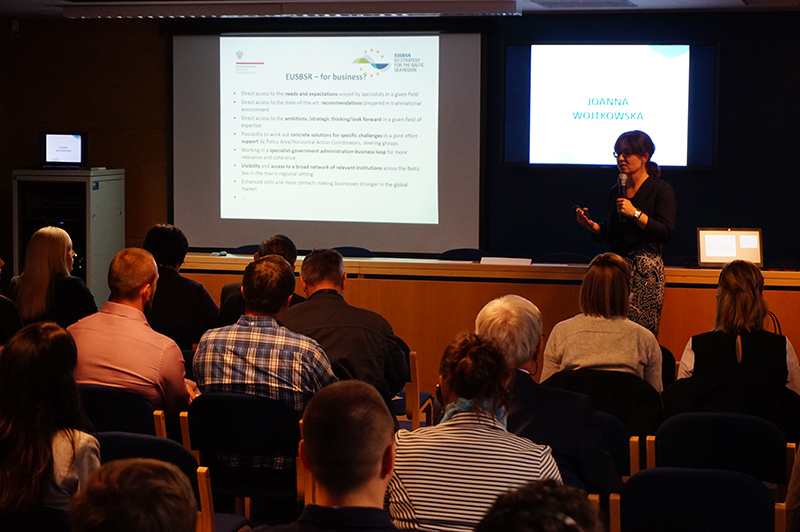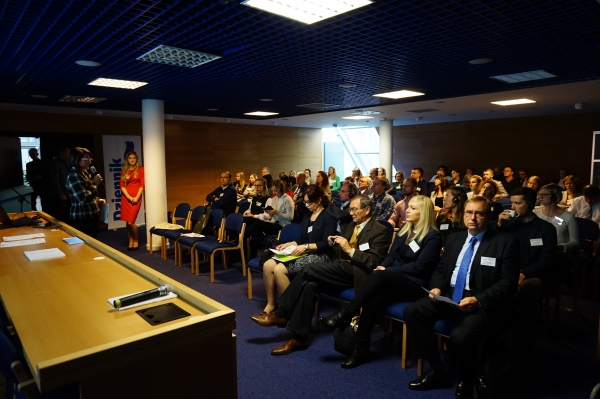As we know, 8 countries participate in actions and projects related to the EU Strategy for the Baltic Sea Region (EUSBSR). The seminar showed that the Strategy means not only indirect access to the EU funds but also direct access to the needs and expectations voiced by specialists in a given field; to the state-of-the-art recommendations prepared in transnational environment; to the ambitions in a given field of expertise. It also means the possibility of working out concrete solutions for specific challenges in a joint effort-support by Policy Area and Horizontal Action Coordinators, as well as visibility and access to a broad network of relevant institutions across the Baltic Sea in the macro-regional setting. At the same time, as noted by Joanna Wojtkowska, the Polish EUSBSR Coordinator, the Strategy is a set of aims that need business in its implementation.

Photo: Marcin Szumny, Pomorskie Voivodeship Marshal's Office
As Christopher Reeves from the Baltic Development Forum pointed out, when presenting the results of the Reaching Out survey made as part of ‘Let’s Communicate!’, the current barriers for business involvement include the lack of administrative capacity of companies, poor understanding of business and logic, lack of concrete benefits for businesses, abstract outcomes, the insufficient understanding of state-aid-rules, project administration, financial reporting, and high co-financing rates. PA Ship and Safe Coordinators, Ditte Folke Kikkert Henriksen and Jouni Lappalainen, explained why it is so important to attract business partners. First of all, it is crucial to involve “end users” to ensure that results are usable; secondly, business tends to be critical and not go into projects that do not seem to produce valuable results; last but not least, it is important to address the challenges for businesses to be involved in projects.
During the seminar, Jerzy Czuczman from Association of Polish Maritime Industries FORUM OKRĘTOWE presented the LeaderSHIP 2020 Strategy and its implementation in Poland, and Magda Leszczyna-Rzucidło from “Pomorskie in the EU” Association encouraged international cooperation focused on smart specialisations and blue growth, as well as explained the cooperation opportunities collected in the Smart Blue Regions project.
‘Being involved in an EUSBSR Flagship means influence!,’ stated Jacob Brinch Nielsen from Rocket Brothers, involved in the EfficienSEA project. Bogdan Ołdakowski (Baltic Ports Organization) presented the ports perspective on clean shipping projects, such as: LNG in the Baltic Sea Ports project I & II, HEKLA: Helsingborg & Klaipeda LNG Infrastructure Facility Deployment, Green InfraPort, and GoLNG. He noted that ports have a crucial role in making the Baltic Sea Region a model region for clean shipping. ‘For us, the real value in EU projects is cooperation – not necessarily money,’ he said. Anders Trewe from ColdCut Systems similarly remarked: ‘Business involvement is needed to really implement project results and make a lasting difference!’ He also presented a checklist of recommendations for SME’s intending to get involved in EU projects.
Practical information on EU programmes and funds (Interreg Baltic Sea Region, Interreg South Baltic, Horizon 2020, and Bonus) was also there; it was presented by Agnieszka Lipińska, Monika Cholewczyńska-Dmitruk, Renata Downar-Zapolska and Minna Ulvila.
The participants could discuss this, as well as potential future projects, during a mingling session in the afternoon.
As concluded by Krystyna Wróblewska, the Plenipotentiary of the Board of “Pomorskie in the EU” Association, EUSBSR is a framework also for the business sector to build networks and cooperate!
Presentations of the event can be found either on Dropbox or GoogleDrive account of the "Pomorskie in the EU" Association.
Media patrons of the event: Dziennik Bałtycki and Radio Gdańsk.
The event was co-ordinated and this blog bost written by Paulina Szmidka from “Pomorskie in the EU” Association.




